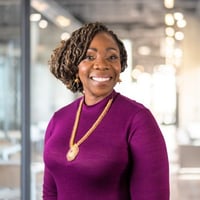Jackie Glenn is a Corporate Culture Architect, Career Development Advisor and the Founder and CEO of Glenn Diversity Inclusion & HR Solutions. Her life’s journey focuses on helping organizations across the globe, including her former employer EMC, create corporate cultures that reflect the diverse world they are aiming to serve.
 Recently I spent some time chatting with Jackie, learning more about her background and why exactly Diversity, Equity and Inclusion (DEI) should be a top priority for businesses in every industry to attract and retain top talent. Here’s what she had to say:
Recently I spent some time chatting with Jackie, learning more about her background and why exactly Diversity, Equity and Inclusion (DEI) should be a top priority for businesses in every industry to attract and retain top talent. Here’s what she had to say:
Meghan: Why should organizations pay attention to DEI in 2022 and beyond?
Jackie: When people hear the words "diversity, equity and inclusion," they think it's the right thing to do or a nice-to-have. I like to say that diversity is a business imperative, not a social nicety. DEI is important for business leaders who want to recruit the best and the brightest talent for their organization, so it can continue to grow and scale.
If you're looking to get the best and the brightest talent, individuals will not come to your organization if they can't look around and see someone who looks like them. A study in 2019 said that upwards of 60% of individuals would not accept a job if the culture did not embrace diversity. This number is likely even higher now in 2022.
 Right now, we are in a period of The Great Resignation. People are leaving jobs and deciding to either start their own business or find something that works better for them. There’s so much opportunity out there that people can really pick, choose and refuse, as I like to put it. There's a war on attracting the best talent.
Right now, we are in a period of The Great Resignation. People are leaving jobs and deciding to either start their own business or find something that works better for them. There’s so much opportunity out there that people can really pick, choose and refuse, as I like to put it. There's a war on attracting the best talent.
As an HR practitioner by trade, I’m passionate about HR leaders and reminding them – because they are the people in the organization that deal with leaders – that customers are holding them accountable to mirror the community they live, work and serve.
Customers are asking, “What are you doing for diversity? Can you show me your stats?” When DEI is a priority, organizations have more innovation, they are more profitable, and people are happier.
Meghan: Let’s expand a little bit on the role that DEI plays in attracting, engaging and retaining talent in 2022 and beyond.
Jackie: I am going to start by going back to 2020. I have coined this period of time, "the era of the four Ps," which stands for the pandemic, protests, politics and prejudice. Many people were shut in during the pandemic and we witnessed in real-time the killing of a Black man. This made us take stock in a lot of areas in our professional and personal lives – looking at where we work and who we work for. People are being very intentional and deliberate about when and where they accept a job.
Diversity plays a huge role in attracting talent. If people visit your website and they don't see any diverse people on the leadership team, they're not coming there. A lot of people of color are underrepresented and minorities are being more intentional and deliberate in terms of choosing where to work.
There’s a video featuring Dr. Shirley Davis, where she talked about how to build an inclusive culture so you can attract and retain people. In it, she talks about The Great Resignation. There have been a lot of people leaving the workforce in droves, either to spend more quality time with their family or to go to another job that has better diversity or offerings in terms of salary and compensation.

While diversity plays such a huge role in attracting, it also plays a major role in engagement.
For example, you can attract me to come to your company, but if your culture is not one that is inclusive and I feel like I'm not being treated equitably or that I belong, then I'm going to leave. This is where engagement and retention come into play by creating an inclusive company culture.
Meghan: Based on your work with countless organizations, how have you seen DEI help businesses thrive?
Jackie: In 2018, I left corporate America and started my own practice, Glenn Diversity. Since then, I’ve been working with small, medium and large organizations and their leaders. Overall I will preface it by saying no one has the sweet sauce and is thriving by doing DEI flawlessly. All companies are on their own journey.
What helps some organizations thrive is that there is accountability at the top of the organization, and it is embedded throughout.
For instance, I work with several organizations and most of the ones that are thriving are the ones where the CEO and the leadership team are engaged in the diversity strategy. In one organization, the CEO leads the diversity advisory council and always has a diversity topic for discussion in their all hands meeting to keep it top of mind.
 Unfortunately, people think that just because you are in HR, you should know the ins and outs of diversity and that is so far from the truth. The organizations that thrive make sure that all their HR practitioners are well-versed, well-trained and well-certified in DEI.
Unfortunately, people think that just because you are in HR, you should know the ins and outs of diversity and that is so far from the truth. The organizations that thrive make sure that all their HR practitioners are well-versed, well-trained and well-certified in DEI.
As a former Chief Diversity Officer, I always remind people that diversity is all our jobs, but you need to have one person who can shepherd this work. I see a lot of companies changing their approach to this one.
I always like to look at diversity as having a seat at the table, equity is having a voice, inclusion is having that voice be heard and then belonging is value in the voice. All four of them are equal.
Meghan: What is one thing leaders can do today to improve their DEI strategy and create an inclusive culture?
Jackie: Don't let DEI be a once a month, twice a month or three times a year initiative – don't make it so programmatic. Celebrating months such as Black History Month or Women's History Month is great, but what is your ongoing strategy?
For example, maybe you focus on education and awareness as it pertains to DEI this year. This could look like educating and awareness building for the first six months of the year. Then in the second part of the strategy, we are going to put together a council of executives and employees to really focus on the three pillars that we want to be our staple for the next four years.
I believe that education and awareness building is paramount to making sure that a diversity strategy works. Companies need to make sure that DEI is not a box-checking exercise or a one-and-done, but rather that they're being more deliberate and intentional to create an inclusive company culture.
Stay tuned for part two of our DEI series with Jackie Glenn, where we will uncover what it truly means to be an employer of choice in 2022. In the meantime, check out our other posts on DEI and subscribe to our blog to see more content just like this.

 Meghan Barrett
Meghan Barrett

